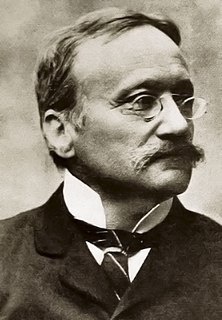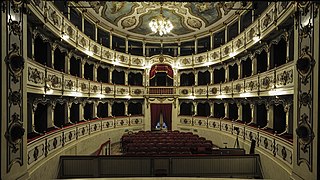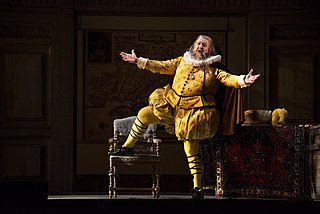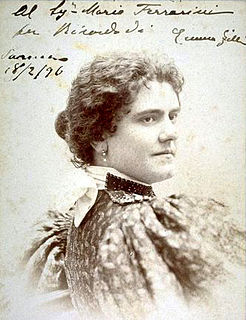
Giuseppe Fortunino Francesco Verdi was an Italian opera composer. He was born near Busseto to a provincial family of moderate means, and developed a musical education with the help of a local patron. Verdi came to dominate the Italian opera scene after the era of Vincenzo Bellini, Gaetano Donizetti, and Gioachino Rossini, whose works significantly influenced him. By his 30s, he had become one of the pre-eminent opera composers in history.
A baritone is a type of classical male singing voice whose vocal range lies between the bass and the tenor voice types. Originally from the Greek βαρύτονος (barýtonos), meaning heavy sounding, music for this voice is typically written in the range from the second F below middle C to the F above middle C (i.e. F2–F4) in choral music, and from the second A below middle C to the A above middle C (A2 to A4) in operatic music, but can be extended at either end. The baritone voice type is generally divided into the baryton-Martin baritone (light baritone), lyric baritone, Kavalierbariton, Verdi baritone, dramatic baritone, baryton-noble baritone, and the bass-baritone.

Arrigo Boito was an Italian poet, journalist, novelist, librettist and composer, best known today for his libretti, especially those for Giuseppe Verdi's last two monumental operas Otello and Falstaff and his own opera Mefistofele. Along with Emilio Praga and his own brother Camillo Boito, he is regarded as one of the prominent representatives of the Scapigliatura artistic movement.

Tito Gobbi was an Italian operatic baritone with an international reputation.

Luis Ernesto Alva y Talledo, better known as Luigi Alva is a Peruvian operatic tenor. A Mozart and Rossini specialist, Alva achieved fame with roles such as Don Ottavio, Count Almaviva and Fenton. He retired from the stage in 1989.

Teatro Giuseppe Verdi is a small opera house located in a wing of the Rocca dei Marchesi Pallavicino on the Piazza Giuseppe Verdi in Busseto, Italy, a town closely associated with the life of the opera composer, Giuseppe Verdi. From the 13th century, the “rocca” or “fortress” was the family’s palace; it is now the city hall after being acquired by the municipality in 1856. The theatre opened on 15 August 1868 and seats 300.

Falstaff – Symphonic Study in C minor, Op. 68, is an orchestral work by the English composer Edward Elgar. Though not so designated by the composer, it is a symphonic poem in the tradition of Franz Liszt and Richard Strauss. It portrays Sir John Falstaff, the "fat knight" of William Shakespeare's Henry IV Parts 1 and 2.

Giuseppe Taddei was an Italian lyric baritone, who performed mostly the operas of Wolfgang Amadeus Mozart and Giuseppe Verdi.
Bülent Bezdüz is a Turkish operatic tenor.

Rolando Panerai is an Italian baritone, particularly associated with the Italian repertory. He was born in Campi Bisenzio, near Florence, Italy and studied with Frazzi in Florence and Armani and Giulia Tess in Milan. Panerai made his stage debut in 1947 in Naples at the Teatro di San Carlo as the pharaon in Rossini's Mosè in Egitto. Other debuts, both in 1951, were as Simon Boccanegra in Simon Boccanegra in Bergamo and as Sharpless in Madama Butterfly at La Scala in Milan. He sang in many rarely performed Verdi operas on radio broadcast for RAI in 1951, such as Giovanna d'Arco, La battaglia di Legnano, and Aroldo. Later roles included most of the great Verdi baritone roles, particularly the title character in Rigoletto, The Count of Luna in Il trovatore, Giorgio Germont in La traviata, Marquis of Posa in Don Carlos, Amonasro in Aida.

Giacomo Rimini was an Italian-born, naturalized-American operatic baritone. He was most admired for his interpretations of the works of Giuseppe Verdi.

Edoardo Garbin was an Italian operatic tenor. He was married to the soprano Adelina Stehle.

Ilva Ligabue was an Italian operatic soprano, best known for the role of Alice Ford in Falstaff, which she recorded twice, under Georg Solti and Leonard Bernstein.

Anthony Michaels-Moore is an English operatic baritone and the first British winner of the Luciano Pavarotti International Voice Competition. Anthony has since performed in many of the world's major opera houses across Europe, the Americas, and Asia. He has distinguished himself as a specialist in Verdi and Puccini roles, most renowned for his portrayals of Falstaff, Nabucco, Rigoletto, Simon Boccanegra, Iago in Otello, Germont in La traviata, Sharpless in Madama Butterfly, and Scarpia in Tosca. In addition to the standard repertoire, he has sung and recorded the baritone roles of some of the less-known 19th Century Italian operas, as well as the popular English art song cycles by Stanford and Vaughan Williams.

Ambrogio Maestri is an Italian operatic baritone. He is especially known for his portrayal of the title character in Giuseppe Verdi's Falstaff. He studied piano and singing in his home town, Pavia. In Italy he has performed at the Teatro alla Scala in Milan, Teatro di San Carlo in Naples, Teatro Regio in Parma, Teatro dell'Opera di Roma, Teatro Regio in Turin, Teatro Verdi in Trieste and the Arena di Verona. Abroad he has performed at the Deutsche Oper Berlin, Teatro Nacional de São Carlos in Lisbon, the Royal Opera House in London, the Teatro Real in Madrid, the Metropolitan Opera in New York City, San Francisco Opera House, the Konzerthaus and the Staatsoper in Vienna, the Gran Teatre del Liceu in Barcelona and others.
This is a discography of Giuseppe Verdi's last opera, Falstaff. It was first performed at La Scala, Milan, on 9 February 1893.

Emma Zilli was an Italian soprano, possibly best known for creating the role of Alice in Verdi's Falstaff in 1893.
The 36 Verdi Transcriptions for piano by the British composer Michael Finnissy were composed between 1972 and 2005. They are based on the works of Giuseppe Verdi.
Carol Smith is an American contralto who made an international career in opera and concert, and was an academic teacher in Zurich and at the Indiana University Bloomington.














